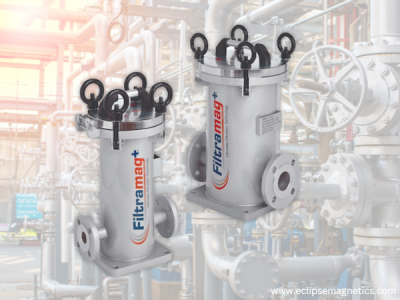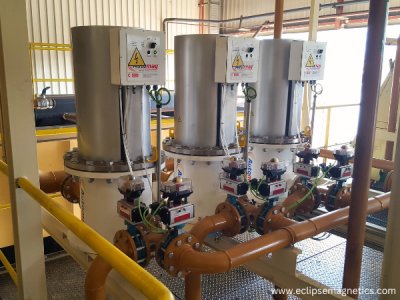Micromag Magnetic Filter
Compact, high-performance grinding coolant filtration systems (flow rates up to 150 litres per min.)
Hello...
Would you like to visit the Eclipse Magnetics US site to view all relevant content for your location?

In the dynamic world of modern industry, companies are always looking for new ways to stay competitive and thrive. As economic pressures, environmental concerns, and global market forces continue to shape the landscape of business, cost reduction and enhanced efficiency have become increasingly important.
In this quest for optimisation, one technology has quietly but profoundly revolutionised the way companies manage their fluid systems, simultaneously cutting costs and boosting performance: magnetic filtration systems.
While the term "magnetic filtration" might not be a household phrase, its impact on various industries has been nothing short of transformative. Magnetic filtration systems have harnessed the power of magnets to efficiently remove impurities from liquids and gases, offering a range of benefits that extend far beyond mere filtration.
In this article, we delve into the remarkable world of magnetic filtration and explore how this innovative technology holds the key to reducing operational costs and enhancing overall efficiency for businesses across diverse sectors.
Discover how Micromag installation resulted in a £142,500 annual cost saving for Bowers Group
Magnetic filtration systems, although not widely recognised, represent a groundbreaking technology with the potential to redefine how industries manage their fluid systems. In this section, we'll delve into the fundamentals of magnetic filtration, explaining what it is, how it works, and where it can be effectively utilised.
Magnetic filtration systems, as the name suggests, are systems which use powerful magnets to capture and remove ferrous (iron-based) and paramagnetic particles from fluids. These systems operate on a simple principle: as the contaminated fluid passes through a magnetic field, ferrous and paramagnetic particles are attracted to the magnet's surface, effectively separating them from the clean fluid.
Magnetic filtration systems consist of a housing or container that houses one or more high-strength magnets. The magnetic field generated by these magnets is strategically designed to maximise particle capture efficiency.
Understanding the mechanics of magnetic filtration systems is crucial to grasp how they function. The operation of these systems can be broken down into the following steps:
Fluid Inflow: Contaminated fluid, whether it be a lubricating oil, coolant, hydraulic fluid, or process water, is introduced into the magnetic filtration unit.
Magnetic Field Interaction: As the fluid flows through the system, it passes through the magnetic field generated by the powerful magnets. When ferrous and paramagnetic particles in the fluid encounter this field, they become magnetised.
Particle Capture: The magnetised particles are drawn towards the magnet's surface and securely held in place. These particles adhere to the magnet, preventing them from re-entering the clean fluid stream.
Clean Fluid Outflow: The purified fluid, now free from ferrous and paramagnetic contaminants, exits the magnetic filtration system and returns to the industrial process, ensuring a cleaner and more efficient operation.
Learn how Automag Skid installation has enabled Vallourec to save £1,000 per week
Magnetic filtration systems have found application in a wide range of industries, thanks to their versatility and effectiveness. Some of the key sectors where magnetic filtration systems are deployed include:
Manufacturing: In manufacturing processes, these systems are employed for the filtration of cutting fluids, coolants, and lubricating oils, helping maintain the integrity of critical machinery and reducing maintenance costs.
Automotive: Magnetic filtration systems are used in engine and transmission systems to ensure the cleanliness of oil and other fluids, improving the longevity and performance of vehicle components.
Oil and Gas: In the oil and gas sector, magnetic filtration is applied for the purification of hydraulic and lubrication fluids, protecting expensive equipment such as compressors and turbines from wear and damage.
The adaptability of magnetic filtration systems extends beyond these industries, as their effectiveness in capturing and removing contaminants transcends sector boundaries. As we move forward in this article, we will explore in more detail how the implementation of magnetic filtration systems in these industries translates into significant cost savings and enhanced operational efficiency.
 Magnetic filtration systems offer many cost-saving benefits, making them an attractive solution for companies seeking to optimise their operations. In this section, we will explore these financial advantages and provide insights into the real-world cost reductions that businesses have experienced by implementing magnetic filtration technology.
Magnetic filtration systems offer many cost-saving benefits, making them an attractive solution for companies seeking to optimise their operations. In this section, we will explore these financial advantages and provide insights into the real-world cost reductions that businesses have experienced by implementing magnetic filtration technology.
One of the most substantial cost-saving advantages of magnetic filtration systems lies in their ability to extend the lifespan of critical machinery and equipment.
By effectively removing ferrous and paramagnetic contaminants from lubricants, coolants, and hydraulic fluids, these systems prevent abrasive wear and damage, reducing the frequency of equipment maintenance and replacement. This leads to significant savings in terms of maintenance costs, spare parts, and production downtime.
Magnetic filtration systems efficiently remove contaminants from industrial fluids, allowing these fluids to be reused for longer periods. This not only reduces the costs associated with purchasing and disposing of large volumes of fluids, but also contributes to environmental sustainability by minimising waste generation.
Cleaner fluids, thanks to magnetic filtration, promote energy efficiency. The reduced friction and wear in machinery not only lengthen their lifespan but also decrease energy consumption, contributing to lower operational costs and a smaller environmental footprint.
While cost reduction is a primary objective for many companies, improved efficiency often accompanies the implementation of magnetic filtration systems, making them a powerful double-edged tool for industrial optimisation. In this section, we will explore how magnetic filtration enhances operational efficiency in various ways.
One of the most noticeable efficiency gains with magnetic filtration is the reduction in maintenance and downtime. By preventing wear and damage to critical machinery, these systems ensure that equipment remains operational for longer durations without the need for frequent repairs. Reduced downtime translates into higher production capacity and fewer disruptions in the manufacturing or production process.
Magnetic filtration systems contribute to enhanced product quality by removing contaminants from process fluids. This is especially crucial in industries such as food processing and precision manufacturing, where product quality is non-negotiable. Cleaner fluids lead to fewer product defects and less scrap, improving overall quality control.
Cleaner fluids result in smoother and more efficient machine operation. Reduced friction, wear, and overheating allow machinery to operate at higher speeds and capacities without compromising their longevity. This, in turn, leads to an increase in overall production rates and output.
Magnetic filtration systems contribute to better heat transfer within equipment and machinery. Reduced fouling and contamination in heat exchangers and cooling systems lead to improved temperature control and efficiency. This can be particularly beneficial in industries that rely on precise temperature control, such as chemical processing.
In a world where every penny counts and every operation must run like clockwork, magnetic filtration emerges as a cost-effective and performance-enhancing asset. It allows companies to not only survive in an increasingly competitive landscape but to thrive and grow. The power of magnetic filtration is clear, and its potential is boundless, promising a future where efficiency and cost savings go hand in hand.
Incorporating magnetic filtration systems into your industrial processes may be the key to a more profitable, sustainable, and efficient future. So, as you consider the challenges and opportunities that lie ahead for your business, remember the magnetic marvel that can help you reduce costs and enhance efficiency in a single stroke. The choice is yours, but the path to optimisation has never been clearer.
If you’d like to find out more about how magnetic filtration could facilitate cost savings in your business, contact our filtration team today for a no-obligation consultation.